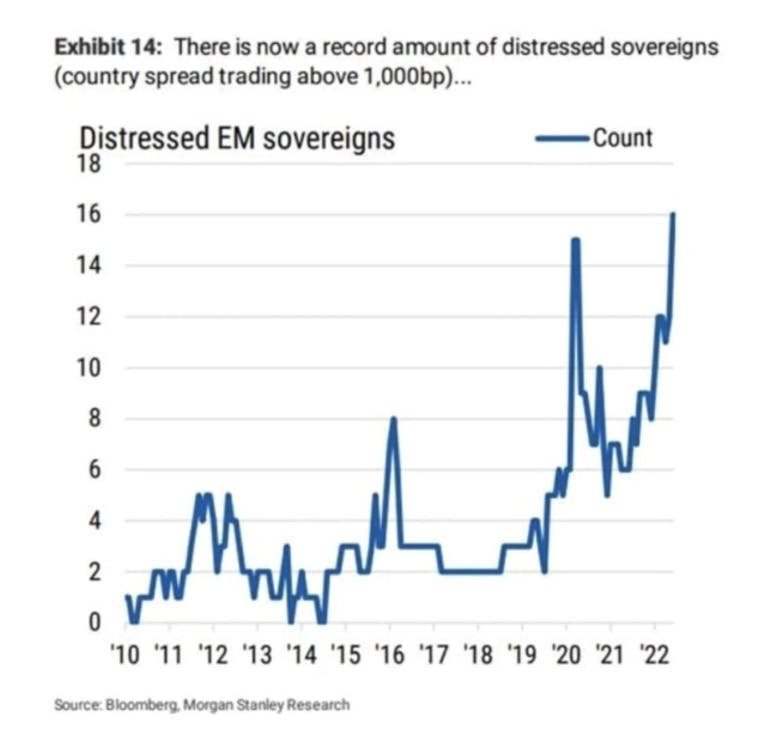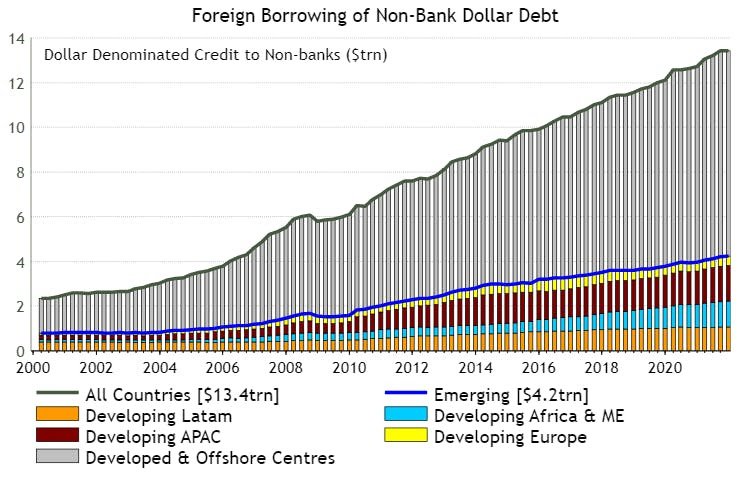Why A Strong Dollar Is Bad News
We do not watch a lot of financial cable news here at Pebble HQ. In fact, we would rather just do about anything than watch CNBC.
Please take that as well-intentioned and high conviction advice.
Your phone has more up to date prices; online news sources do a better job transmitting basic information, and reading this newsletter (or many others!) will be more beneficial for achieving insight into how the world works.
But we did notice white House economic adviser Jared Bernstein on Bloomberg TV this week arguing that actually, the administration quite likes a strong US Dollar.
This sentiment caused our eyebrows to jump rather dramatically because we feel very confident that either Mr Bernstein is not telling the truth or the standard of economic expertise in the White House is even more parlous than we believed.
Now, the strength of the US Dollar has been in the news a lot lately. It has even reached the popular (and populist!) press with many online forums and social media platforms full of Americans reveling in just how far the greenback goes in Mykonos or Capri or along the Champs D'Elyses or Omotesando Street.
That is all fine and well but away from the basic "my Aperol Spritz is 20% cheaper" or even the more questionable "America: F*ck Yeah!" nationalism, the rising US Dollar is a trend that is almost guaranteed to create more problems than it solves.
Here are the basics:
The Dollar is expensive. It has recently reached a 20 year high and is now around 50%+ up from its 2008 low.
This is quite a change, for the US and also for the global economy.
Itit is true that, as many analysts point out, a big part of the above appreciation is happening because of depreciation occurring in other big, developed market currencies. The Japanese yen is at its lowest since 1998 and the Euro is at its lowest since 2002. These are two of the biggest components of the index.
Why is that happening?
Well, it is because foreign central banks are not tightening policy or raising rates at the same clip as the US Federal Reserve. These foreign currencies are therefore less attractive to own because, speaking very generally, Japanese or European assets come with a dramatically lower yield.
Put crudely, why would you want to own a German 10 year bond at 1.1% when you can own a US 10-year bond at 3.1%?
This is leading to a serious dislocation currency-wise which is great if you are buying European goods or partying in the Cote D'Azur but otherwise, it has major drawbacks.
The single biggest impact is in terms of inflation. You think 9%+ inflation is bad in the US - imagine if you were dealing with a similar figure in Europe or the UK or Japan only you then had to add a 20% currency depreciation on top of it....
That will not just hurt, it might even leave a permanent economic mark. i.e.: a recession.
Remember many Europeans (or Japanese) purchase goods priced in dollars all the time. Whether it be an iPhone or a tank of gasoline (or Europeans' favorite, diesel) or fertilizer or even many basic foodstuffs, the dollar, not their home currency, determines the price.
Staying home and skipping a visit to New York or Disney World won't save them, in other words.
But this isn't all. A pricey US Dollar has quite a few impacts that go less discussed in the jingoistic "have fun being poor, Johnny Foreigner" circles online.
Here are 4:
The first is that an expensive dollar negatively impacts global trade.
The dollar is the dominant currency for global trade invoicing which means that when the dollar goes up, fewer trade deals get done. As we see with the Euro or the Yen, when non-US currency purchasing power declines it becomes difficult for consumers/companies/countries to afford all manner of goods.
Second, this isn't just true for developed markets either. The US Dollar is an even greater wrecking ball for emerging or developing markets.
And these countries are hurting extremely at present. A (far) more expensive US dollar means these countries have to spend more to a) service debts priced in dollars, b) pay more to import vital commodities such as energy and food and c) find it harder to borrow or find dollars to do deals such as above.
Here are the number of developing economies in severe distress at present according to Bank of America (their debt is priced suggesting that country will go bankrupt, essentially):
Sri Lanka has already defaulted. It won't likely be alone. Pakistan is almost certain to do so as well as many others.
Each one of those bankruptcies has major costs for those countries' populations.
There is $13.4 trillion in US dollar debt outside of the US and that is a problem for developed and developing countries alike.
Third, it gets less discussed either online or in the financial press but the stronger dollar hurts many large US multinational companies as well.
Why? Well because these are global, multinational concerns!
This means they earn a decent percentage of their profits abroad and are, of course, negatively impacted by reduced purchasing power abroad as we outlined above. Rising dollar environments lead to earnings downgrades with impressive regularity (remember the reverse is also true!).....
Lastly, as we discussed earlier, a strong dollar is inflationary.
Yes, it is generally true that this specific currency-focused inflation will be mostly located abroad in countries with declining currencies but in a globalized economy, inflation is inflation. The US purchases plenty of things from foreign markets. Everything from wine (or whiskey) to cars and semiconductor chips.
In conclusion, stay humble about the almighty greenback. Its strength might help with brunch in Paris or cocktails on the Costa Brava but its strength is - already - breaking things around the globe.
Thus, a mighty dollar today will lead to lower global growth tomorrow. Enjoy those surprisingly cheap and no doubt delicious hors d'oeuvres while you can.
*******
Have questions? Care to find out more? Feel free to reach out at contact@pebble.finance or join our Slack community to meet more like-minded individuals and see what we are talking about today. All are welcome.




